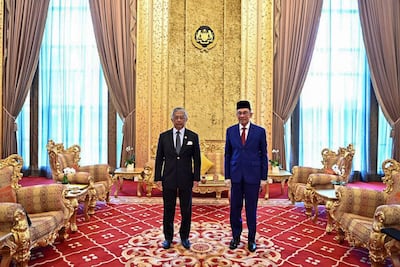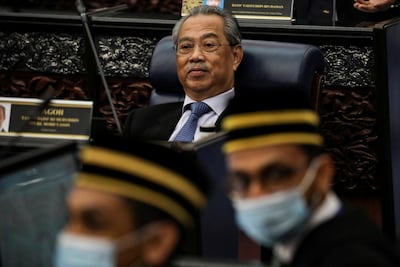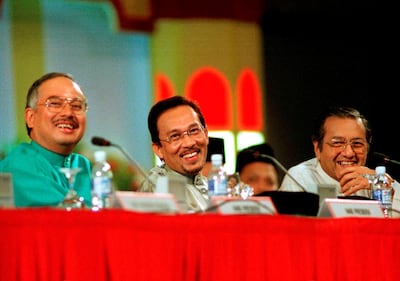When Malaysia’s opposition leader Anwar Ibrahim addressed a news conference on Tuesday afternoon, he had an important announcement to make: he had been to see the country’s King, and had provided documents to prove that he had a “convincing” and “formidable” majority in Parliament. Malaysians are now wondering whether their eternal prime minister-in-waiting is finally on the cusp of the top job that has eluded him for over two decades; or whether this was a last throw of the dice by a 73-year-old man who fears he is running out of time.
If anyone expected Mr Anwar to be named prime minister the same day, they were to be disappointed. Malaysia’s constitutional monarch, Sultan Abdullah of Pahang, will consult meticulously with party leaders to see if Mr Anwar’s numbers add up. In February, when the Pakatan Harapan government that won the 2018 election fell, the King interviewed every MP in the 222-seat lower house to check that the man who took over as Prime Minister, Muhyiddin Yassin, had a majority. This time he could decide to see how Parliament votes on the annual budget in November.

If Mr Muhyiddin loses that vote – and given that he never had more than a very slim majority, it is possible that he will – there could be a general election, which would be hugely unpopular.
This is not least because the third wave of Covid-19 that Malaysia is currently experiencing, which has led to new lockdowns in parts of the country, is generally blamed on politicians returning from the election in the state of Sabah last month. So whether Sultan Abdullah appoints Mr Anwar as prime minister or decides to make him prove that he has a majority in Parliament, we are likely to know the result either way within a few weeks.
If Mr Anwar does succeed, it would be the apex of a tumultuous career. Formerly known as the firebrand leader of a student Islamic group, Mr Anwar was handpicked by Dr Mahathir Mohamad, who led Malaysia from 1981 to 2003 and then 2018 to 2020, and soared up the ranks of the Barisan Nasional coalition that ruled the country from 1957 until the 2018 election. He became deputy prime minister and an heir apparent feted by western leaders who seemed prepared to overlook his links to radical Islamists. But in 1998, Mr Anwar fell out with his mentor and was dismissed and then jailed.
He left Barisan Nasional and later rallied a disparate and shifting opposition alliance to win the popular vote, but not a majority of seats, in the 2013 election. Subsequently jailed again, Mr Anwar was named as the successor to Dr Mahathir (who had also switched to the opposition) if Pakatan Harapan won in 2018. When it did, Mr Anwar received a royal pardon and was re-elected to Parliament, but he was denied the premiership once again when it became clear that Dr Mahathir had no intention of giving way to his former protege. The Pakatan Harapan government collapsed early this year, partly over that issue, when Mr Muhyiddin led a breakaway group into an alliance with MPs from Barisan Nasional and the Islamist party PAS.

Mr Anwar leads the 91 MPs who remain within Pakatan Harapan. If there were some scepticism when he first announced his plan to take over the government last month, that was because he had made a similar claim – in 2008 – that he could induce Barisan Nasional MPs to join him to change the government. He certainly had many discussions – I was in a house in Kuala Lumpur one evening where he was trying to persuade senior Barisan Nasional politicians to cross over – but in the end nothing came of it. This time Mr Anwar seems extremely confident. And crucially Zahid Hamidi, the president of Barisan Nasional's most important party, the United Malays National Organisation (Umno), said he had been told that “a big chunk of Umno and Barisan Nasional MPs have voiced their support” for Mr Anwar. Far from condemning them for seeking to abandon Mr Muhyiddin's government, which Umno has been propping up, Mr Zahid continued: “I respect the decision made by these MPs.”
It has even been suggested that Najib Tun Razak, the Barisan Nasional’s last prime minister, may have given the nod to his supporters in Umno to help Mr Anwar gain his “formidable” majority. Given that Mr Anwar’s last jailing was under Mr Najib’s administration, and Mr Anwar was part of the coalition that unseated him in 2018, that strikes many as extraordinary. Others see all sorts of contradictions. Isn’t Mr Anwar supposed to be a great liberal reformer, whereas Barisan Nasional is more conservative? Mr Anwar leads a multiracial party; Barisan Nasional, by contrast, is dominated by Umno and has always stressed the upholding of Malay rights and privileges.
But this is to ignore three factors.

Firstly, all the key players – including every MP I have mentioned – either are or were members of Umno, and were all in government together in the 1990s or more recently. They have known one another for decades. Politics may be a blood sport in Malaysia, but individually politicians who are nominally fierce opponents may be on quite friendly terms. The exception to this is Dr Mahathir, who is unyielding in his enmity. And the fact that Dr Mahathir has twice undermined Mr Anwar's bid to become prime minister and ejected Mr Najib and Mr Zahid from office in 2018 gives them something else in common.
Secondly, now more than ever Malaysian politics is personality- rather than policy-driven. If it were the latter, then Mr Muhyiddin might be in a more solid position. He has, after all, been a paternal, reassuring figure whom most Malaysians credited with containing the coronavirus, up until the recent outbreak.
Thirdly, while the last election shattered the dominance of the Barisan Nasional, the change of power in February saw Pakatan Harapan shorn of its majority. As it is, Malaysia has an extraordinary multiplicity of parties. Now the ties that formerly bound them have either gone or are weaker than ever. As Sharaad Kuttan, who co-hosts a nightly current affairs show on the local Astro Awani channel, puts it: "We're not going to go back to the stability of the past." His fear is that Malaysia could enter a period of "constantly negotiating alliances" in which "horse-trading becomes the norm".
If that is the case, then while Mr Anwar may be closer than ever to seizing the prize of office, keeping a hold of it and being able to implement a firm agenda may be harder that he could have possibly expected. The same will go for any prime minister. Malaysians may well be fed up of the political rollercoaster, but they had better brace for a bumpy ride ahead.
Sholto Byrnes is an East Asian affairs columnist for The National


